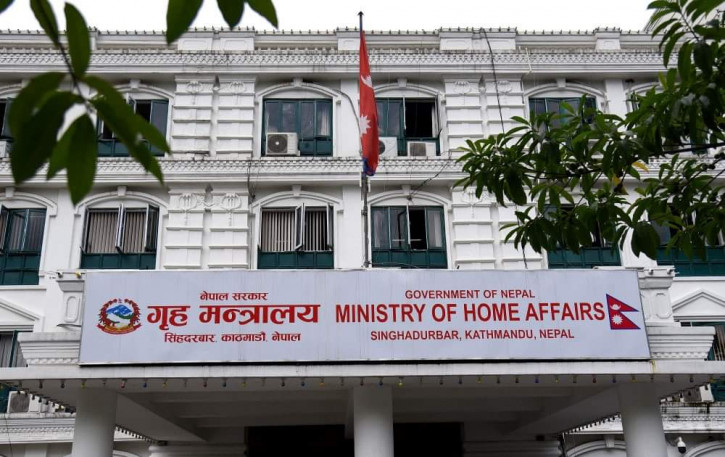
The Home Ministry has prepared a working procedure for providing Rs 200,000 each to the then “disqualified" Maoist combatants.
The Cabinet meeting on March 20 decided to provide relief for combatants of the conflict period who were disqualified by the United Nations Mission in Nepal (UNMIN) during the verification process by preparing working procedure. The Finance Ministry had given permission to prepare the working procedure four days before that.
The working procedure mentions that Rs 1.40 billion has been allocated in the budget for the current fiscal year 2079/80 to complete the remaining works of the peace process.
The Pushpa Kamal Dahal government is preparing to pay each disqualified combatant Rs 200,000 through respective district administration offices within the current fiscal year. The working procedure states that the details of the disqualified combatants will be sent to the respective administration offices.
The district administration offices will have to recommend to the Home Ministry that the person is a disqualified combatant on the basis of self-declaration, recommendation letter and name, surname and address as per the citizenship certificate after receiving those details.
The working procedure states that a task force including representatives from the then Maoist combatants can be formed for facilitation of the process.
The Home Ministry will transfer the money to the district administration offices concerned for distribution once the Finance Ministry releases the money.
The legal claimant will get the money if the disqualified combatant is already dead while the combatant can get the money after returning to Nepal if s/he is outside the country.
The disqualified combatants will be paid by the district administration offices where the citizenship certificate was issued. If they reside in another district, the two districts would coordinate in distribution of the money.
The seven political parties and the Maoists on November 8, 2006 had agreed to keep Maoist combatants in the main cantonments at Kailali, Surkhet, Rolpa, Palpa, Kavre, Sindhuli and Ilam districts, and that the combatants would be verified and monitored by the UN to hold peaceful and fair Constituent Assembly Election without any fear, and democratization and restructuring of the Nepal Army as per the spirit of the 12-point agreement, 8-point agreement, 25-point code of conduct, and the five-point letter sent to the UN on August 9, 2006.
The peace agreement signed on November 21, 2006 after that had agreed to keep the Maoist combatants and their weapons in the cantonments.
The agreement for monitoring of management of the weapons and combatants on December 6, 2006 then set standards for Maoist combatants. The person must have joined the Maoists before May 25, 2006, and be born before May 25, 1988 to qualify as combatant during the verification process.
A total of 4,008 persons did not meet those criteria mostly on the grounds of age, and did not get to choose voluntary retirement to get a lump sum from the state or get integrated in the Nepal Army.
There were a total of 32,350 combatants in the cantonments when the Maoists renounced violence and signed the peace deal. Many of them left the cantonments and UNMIN ruled 19,602 of them eligible to be counted as combatants while 4,008 did not qualify to be counted as combatants.
The Nepal Army took charge of the Maoist combatants in April 2012 while agreement for integrating the Maoist combatants into the Nepal Army was reached on November 1, 2012.
A total of 15,630 Maoist combatants, however, opted for voluntary retirement and returned home with Rs 500,000-800,000 while 1,422 were integrated in the Nepal Army. The state spent around Rs 20 billion for running the cantonments, integration of the combatants and payment for those who chose voluntary retirement.
There were demands that the Maoist child soldiers who were disqualified during the verification process be compensated by the government at that time while many opined that those deemed disqualified need not be paid with the taxpayers’ money.
The then Baburam Bhattarai government on October 21, 2012 had decided to pay Rs 200,000 to each of those disqualified combatants. But the Supreme Court (SC) was moved against the decision and the government could not dole out the money.
The then KP Sharma Oli government had allocated Rs 840 million to pay Rs 200,000 each to the disqualified combatants and those who had opted for voluntary retirement but had not received the lump sum in the budget for the fiscal year 2073/74.
Bishnu Paudel was the finance minister in the coalition government including CPN-UML and CPN (Maoist Center) then. NC lawmakers and conflict victims had moved the SC against the decision and a short-term order by the single bench of Justice Gopal Parajuli had stopped that.
The current government has again decided to pay the disqualified combatants when Maoist Chairman Dahal is the prime minister (PM).
Maoist Center argues that the past governments had also taken the decision and adds that the current government is preparing to provide relief by formulating working procedure as the SC had instructed to pay them only after preparing working procedure.











